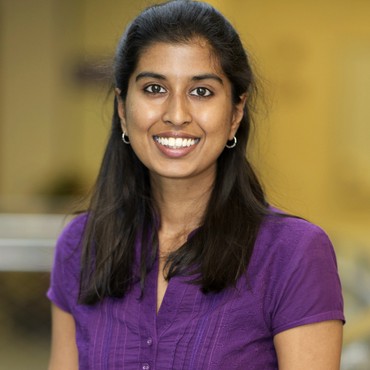Akshitha Sriraman awarded David J. Kuck Dissertation Prize for work on hyperscale web services

CSE alum Akshitha Sriraman has been selected as the 2021 recipient of the David J. Kuck Dissertation Prize. Established by alum David J. Kuck, the annual award recognizes the most impactful PhD dissertation submitted by a student in the University of Michigan’s program in Computer Science and Engineering.
Sriraman graduated from U-M in 2021. Her dissertation, “Enabling Hyperscale Web Services,” explores how to bridge computer architecture and software systems to tackle new challenges posed by massive web services.
Modern web services like social media, online messaging, web search, video streaming, and online banking need to support billions of users, requiring data centers that scale to hundreds of thousands of servers. Services and data centers of this size are often called hyperscale. This trend shows no sign of slowing, as more futuristic applications expand in use, such as virtual reality, self-driving cars, conversational AI, and the Internet of Things.
In her dissertation, Sriraman presented technologies to enable these burgeoning web services to “meet the world’s expectations.” She tackled two key challenges facing hyperscale web services – the rapid, sudden growth of data and user base, and the decline in hardware performance scaling.
“To enable this new hyperscale era, hardware architects must become more aware of hyperscale software needs and software researchers can no longer expect unlimited hardware performance scaling,” she wrote.
Sriraman argued that systems researchers will need to abandon the traditional approach of building each layer of the systems stack separately. Instead, “they must rethink the synergy between the software and hardware worlds from the ground up.”
According to her dissertation, this synergy will involve software that is aware of new hardware constraints and hardware that is architected to efficiently support new hyperscale software requirements. The dissertation presents a number of mechanisms to address both prongs of this solution, and uses them to offer new insights into these problems. Her contributions include:
- Presentation of the first open-source benchmark suite of end-to-end modern web services that facilitates future academic and industry research
- Identification of new insights in the age-old research area of software threading models that led to redesigning threading models for hyperscale web services
- Characterization of shortcomings in commodity hardware running hyperscale web services that influenced the design of commercial CPU architectures
- Demonstration of how existing commodity hardware can be used more efficiently to enable hyperscale web services that resulted in real-world data centers prioritizing this approach’s adoption over the modern-day trend of customizing hardware
- Demonstration of how existing hardware mechanisms can intelligently be used to overcome new web service software overheads
- Presentation of a systematic understanding of hardware customization opportunities at hyperscale that enabled industry-academia joint benchmarking efforts, influenced commercial hardware design, and improved software development
- Presentation of a rigorous, analytical alternative to ad hoc hardware customization approaches that enabled real-world hyperscale data centers to make well-informed hardware investments
Sriraman will begin as an Assistant Professor at Carnegie Mellon University in the Electrical and Computer Engineering Department in January, 2022. There, she continues her work on designing software that is aware of new hardware constraints/possibilities and architecting hardware that efficiently supports hyperscale software requirements.
 MENU
MENU 
